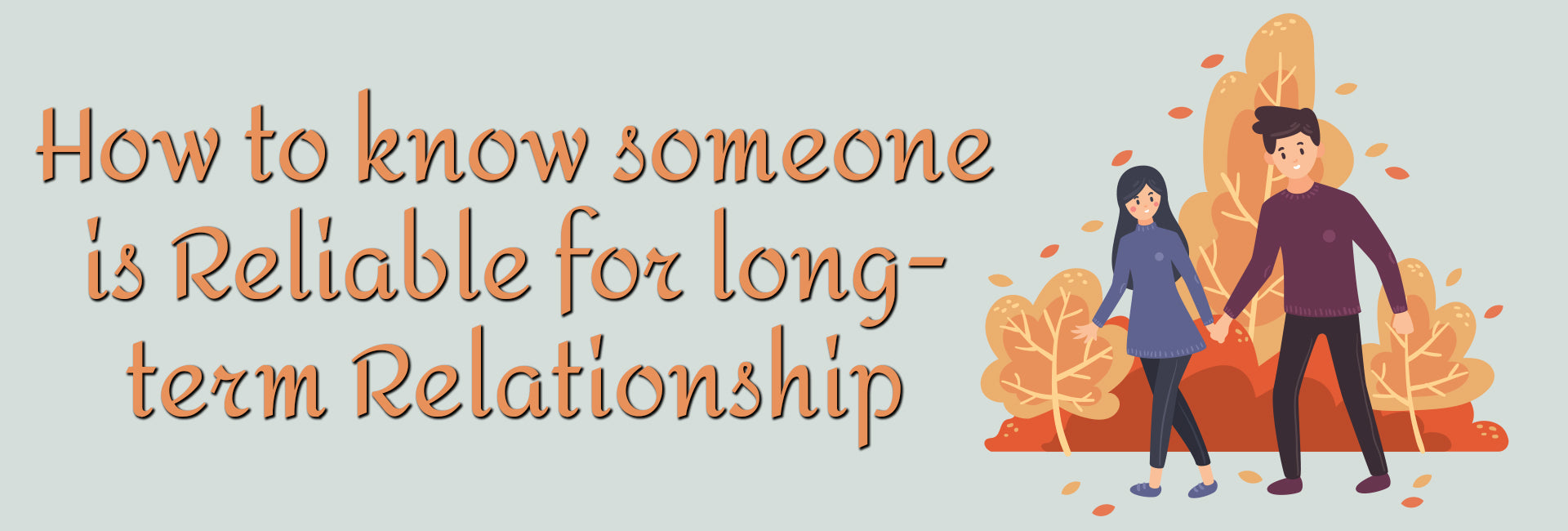How to know someone is reliable for long-term relationship
How to know someone is reliable for long-term relationship
Loyalty is fundamental to all the relationships in our lives whether it’s with a partner, colleagues or friends. But sometimes problems arise when establishing loyalty that can be damaging to the relationship. Learning more about the causes and signs of trust issues can empower us to mend and strengthen our connections and taking steps to overcome trust issues will help you to ensure that your relationships are healthy and fulfilling.
All this leads to a lot of problems and suffering. Due to this many women wind up in situationships or relationships that will go nowhere with a partner that can’t make them happy even if they try. So, after sometime many break up and can find themselves exhausted with diminishing hope that love and relationships will be happy and potentially easy. Then they are reluctant to date fearing another heartbreak. Many develop even more limiting beliefs about themselves, life, men and love. For instance, “Love is only for the lucky ones” or “all good men are taken”. Also, think of how much more difficult things can become due to these beliefs. So, it’s very crucial to figure out how to recognize who's right for you to avoid wasting so much time and causing yourself so much struggle. Today, in this blog, we will find out more about how to know someone is reliable for long-term relationships.
What are Trust Issues?
Trust Issues are the challenges that some people face in believing that others are honest, reliable and loyal. Experiencing trust issues can mean that you are constantly battling doubts about others' intentions that often leads to feeling isolated or misunderstood. It can also keep you from forming and maintaining healthy relationships out of fear that you may be hurt or betrayed. The lack of trust can influence all the areas of your life, from professional interactions to personal relationships. But firstly, it’s crucial to understand the optimistic elements of trust in our relationships and in life too.
Traits to know someone is reliable for long-term relationship. You like each other’s extreme traits.
Which is more often true: “Birds of a feather flock together or Opposites attract”? People do tend to partner with others who are similar to them and who share the values. However, it is easy enough to think of relationships that work despite the differences. Where shared inclinations and values tend to be crucial and it is one or both the partners and is very extreme in a particular area. Democrats and Republicans where shared inclinations and values tend to be most crucial though and one or both partners is very extreme in a particular area. Most other potential partners would find either of us difficult to live with because we are on the extreme end of the normal curve.
However, extreme opposite traits can initially attract you to someone- a shy, quiet person attracted to someone who has hundreds of friends and is an expert social networker. Moreover, the more extreme the other person is in a particular regard, the more likely it is that you will find your differences annoying in future. Non-narcissists are initially attracted to the narcissist charm and it is one significant example of this pattern. When your partner has any extreme traits then you don’t need to be as extreme as they are but it is simpler going forward if you are not the complete opposite.
Your partner is warm, dependable
Everyone has their priorities for what they want in a partner. Some people value looks more than status or money, while for others it’s the reverse. Despite differences in people’s particular ideals and priorities, almost everyone-both women and men want a partner who is trustworthy, reliable and warm.
Furthermore, if your partner is warm towards you and other people which is a good sign. Such as if they are emotionally dependable then that is also a great sign. If they are aloof or narcissistic towards others but it is nice to you which is a potential warning sign: Their treatment of others might be more revealing of their true colors.
Top 6 Positive Aspects of Trust in our Lives
Being Yourself : When trust is present, you are able to be your true self without the fear of betrayal or judgement. This authenticity is a key to building genuine relationships.
Focusing on Positivity : With Trust, your focus can shift from worry and suspicion to appreciating and enjoying your connection with others.
Feeling secure : Loyalty offers a sense of security, a crucial element for stable and healthy relationships.
Enhanced intimacy : Trust can enhance your relationships with understanding, intimacy understanding, and stronger bonds.
Reduced stress and anxiety : Trust can help in lowering the levels of stress and anxiety in your interactions. You can also worry less about what may happen and enjoy the present moment. Improved communication : Resolving conflicts and understanding each other can be easier as trust encourages open and honest communication.
Top 4 types of trust issues
Trust issues can happen in several forms. Understanding these various types will help you in approaching these challenges with patience and empathy, both for yourself and others which can open the next door to healthier and more trusting relationships. It’s crucial to remember that trust issues aren't a reflection of your character but instead are a response to past experience.
Trust Issues in Friendships
Trust Issues between friends may make you struggle to open up and share personal thoughts, fearing your friends may let you down. When you doubt your friendships are genuine, forming lasting connections can be challenging.
Trust Issues in Romantic Relationships
People with trust issues in romantic relationships may find it difficult to to believe that their partner is faithful or has the best interests at heart. This can lead to constant doubts and questioning, straining the relationship even if these fears are not based in reality. On the other hand, trust issues in romantic relationships can develop after lying, infidelity or inconsistent communication.
Trust Issues in Family Relationships
Past experiences such as broken promises, family conflicts or inconsistency in support, can lead to distrust within family dynamics. This can also result in hesitancy to confide in or depend on family members.
Trust issues in professional relationships
Trust Issues can affect collaboration and overall job satisfaction. You may doubt colleagues, intentions, competence or reliability. Furthermore, this can also lead to difficulties in delegating tasks, working in teams or building networks.
8 signs of Mistrust in a Relationship
Knowing the signs of trust issues will help you better understand our own behaviour and behavior of others. You can try these approaches with compassion and understanding but with the right tools and mindset you can achieve it.
1) Suspicion : You may find yourself or your partner constantly questioning each other’s actions, motives or whereabouts without a valid reason.
2) Lack of Forgiveness : Holding onto past mistakes on your own or your partner’s can be common with trust issues. This can also keep wounds open and can stop you from moving forward.
3) False Accusations : Regularly accusing a partner of wrongdoing such as infidelity or deceit can be a sign of trust issues and it often stems from the internal fears other than the partner’s behaviour.
4) Self-Sabotage : A fear of getting hurt will lead to behaviour's that will harm your relationship like pushing your partner away, refusing to get emotionally involved or ending the relationship before you get too close.
5) Focusing on Negative : Trust issues may cause you to have a skewed view focusing more on the negative aspects of the relationship and overlooking the positive.
6) Anxiety Symptoms : Constant Worry about the relationship can cause paranoia or even panic attacks that can affect your overall well-being including your physical health.
7) Avoidant behaviors : You may try to protect yourself from the potential hurt by avoiding deep emotional connections, not committing to long term plans or keeping secrets.
8) Needy behaviors : Seeking constant validation from your partner can be exhausting for both the parties, putting strain on your relationship and causing unnecessary discomfort and disagreements.
“Why do you have trust issues?” 7 possible causes of lack of trust in relationships
Trust issues are often the result of past influences and experiences.
Parental Conflicts : Experiences during childhood significantly shaping our ability to trust issues can stem from witnessing conflicts or inconsistency in your care givers in relationships. Inconsistent parenting where attention and love are unpredictable will also contribute to trust issues later in life.
Social rejection or bullying : Being bullied or rejected during formative years such as pre-teen and teen can have a long-lasting impact. Also, these experiences may also lead to a belief that others are not trustworthy.
Betrayal in relationship : Personal experiences of betrayal like cheating partner or a friend breaking confidence will make it difficult to trust others in future.
Traumatic Life Experiences : Traumatic events like witnessing violence, experiencing a natural disaster or any form of abuse can deeply affect your ability to trust.
Attachment Styles : Some attachment styles such as avoidant attachment can make trust more difficult and these styles may develop early in life and influence later relationships.
Previous Personal Failures : Sometimes our own past actions such as someone’s trust will lead us to project these behaviors onto others. This kind of projection will cause us to believe that others may also do the same.
Societal Influence : Sometimes, trust issues can be fueled by news, stories and societal messages that will highlight dishonesty. This can skew your perception of how trustworthy people are.
The bottom line
The definition of a healthy relationship will differ from person to person. However, the common signs of a healthy relationship will include:
Creating safe space for each person to feel heard.
Having an open communication
Setting and maintaining healthy boundaries
If you are worried about your relationship or believe that it is not as powerful as it used to be then you can seek professional support too.



